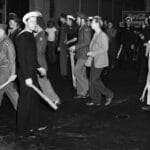Welcome to Hell’s Kitchen, a once gritty neighborhood in New York City, where the notorious Westies gang held sway. This is the story of their brutal reign, their leader James Coonan, and the chilling legacy they left behind.
The Rise of a Hell’s Kitchen Mobster: James Coonan
James Coonan, the notorious leader of the Westies, went from street tough to one of the most feared mobsters in New York City. His story, marked by violence and ambition, provides a chilling glimpse into the criminal underworld.
Coonan’s journey began on the brutal streets of Hell’s Kitchen, where he quickly gained a reputation for his fighting prowess. Violence became his tool for control, but his aspirations extended far beyond street brawls. He sought the power and influence that only a connection to the Mafia could provide.
That connection came in the form of an alliance with the Gambino crime family, one of New York City’s infamous “Five Families.” This partnership opened doors to lucrative criminal enterprises, extending the Westies’ reach far beyond their neighborhood. However, this alliance, like many deals with the devil, would eventually lead to Coonan’s downfall.
In 1986, after years of terrorizing Hell’s Kitchen, the law finally caught up with Coonan. He was arrested and, two years later, found guilty of a litany of charges, ultimately receiving a 75-year prison sentence. His reign of terror was over.
Today, from his prison cell, Coonan has expressed remorse, claiming to be a changed man seeking redemption. However, many question the sincerity of his plea, particularly those whose lives were shattered by the Westies’ brutality.
Will Jimmy Coonan Ever Be Released?
James “Jimmy” Coonan’s bid for freedom is a complex and controversial issue. While he has served over three decades of his sentence, his crimes, particularly the brutal nature of the Westies’ reign, cast a long shadow over his claims of rehabilitation.
Coonan’s legal team points to his advanced age (he is currently 76 years old) and potential health issues as factors to consider for his release. They argue that he is no longer a threat to society. However, the severity of his crimes, including his role in multiple murders, weighs heavily against him.
The question of whether Coonan has truly undergone a genuine transformation remains a point of contention. Some experts believe that decades of incarceration can lead to genuine introspection and change, even for those who have committed heinous acts. Others remain skeptical, arguing that the nature of his crimes suggests a deeply ingrained pattern of violence and disregard for human life. The upcoming parole hearings will likely delve into these issues, analyzing Coonan’s behavior in prison, psychological evaluations, and the potential risks associated with his release.
Coonan’s case raises important ethical questions about the purpose of punishment, the possibility of rehabilitation, and the balance between justice for victims and the potential for second chances. It’s a debate with no easy answers, one that highlights the complexities of the justice system and the lasting impact of violent crime.
Does the Westies Still Exist?
The short answer is no, the Westies, as an organization, no longer exist. Their reign of terror ended with James Coonan’s arrest and imprisonment, and the changing landscape of Hell’s Kitchen has made a resurgence virtually impossible.
Several factors contributed to their demise. Internal strife and betrayals, particularly the decision of Mickey Featherstone to turn state’s evidence, weakened the gang from within. Simultaneously, law enforcement agencies, armed with powerful tools like the RICO Act, were cracking down on organized crime.
Furthermore, the gentrification of Hell’s Kitchen played a role. Once a haven for the Irish working class and a breeding ground for gangs, the neighborhood underwent a dramatic transformation in the late 20th and early 21st centuries. The influx of new residents and businesses significantly altered the social and economic dynamics that had allowed the Westies to thrive.
While the Westies are gone, their story serves as a reminder of a darker time in New York City’s history. Their brutality and the grip they held over Hell’s Kitchen continue to fascinate, providing a glimpse into the allure and consequences of organized crime.
Was Mickey Featherstone a Green Beret?
Mickey Featherstone, James Coonan’s right-hand man and enforcer for the Westies, cultivated an intimidating persona, fueled by rumors of military service as a Green Beret. While Featherstone certainly served in the US Army during the Vietnam War, the veracity of his Green Beret status remains uncertain.
Official military records are needed to definitively confirm or deny his claims. Some sources suggest that Featherstone, while aspiring to join the elite Green Berets, was relegated to a stock clerk role after experiencing heavy combat. The reasons for this reassignment, if it occurred, remain unclear.
It’s possible that Featherstone, seeking to enhance his reputation and instill fear, embellished his military past. The Green Beret mythos, with its connotations of specialized training and ruthless efficiency, would have certainly served him well in the brutal world of organized crime.
Regardless of the truth surrounding his Green Beret status, Mickey Featherstone’s actions speak for themselves. He was a key player in the Westies’ reign of terror, participating in numerous acts of violence. His eventual decision to turn state’s evidence, while instrumental in dismantling the gang, also highlighted the complex and often morally ambiguous nature of those who operate in the criminal underworld.
Key Points:
- James Coonan, leader of the infamous Westies gang, ruled Hell’s Kitchen with ruthless violence.
- Coonan’s ambition led him to forge an alliance with the Gambino crime family, giving the Westies access to greater criminal enterprises but also making them vulnerable to Mafia influence.
- Coonan’s reign of terror ended in 1986 when he was arrested and sentenced to 75 years in prison.
- While behind bars, Coonan has expressed a desire for redemption, but the sincerity of his plea is questioned.
- The Westies’ legacy left a lasting scar on Hell’s Kitchen, serving as a reminder of the devastating effects of organized crime.
- Coonan’s story offers insights into the psychology of criminal power and the impact of the Mafia’s code of silence, “omerta.”
What can be more horrible than killing someone with a motive? Read about the murder that shook the neighborhood of Atlanta.
Do you know about the case of James Byrd Rogers? No? Then you must read this article.
- Unlock Elemental 2 Secrets: Actionable Insights Now - April 2, 2025
- Lot’s Wife’s Name: Unveiling the Mystery of Sodom’s Fall - April 2, 2025
- Photocell Sensors: A Complete Guide for Selection and Implementation - April 2, 2025















